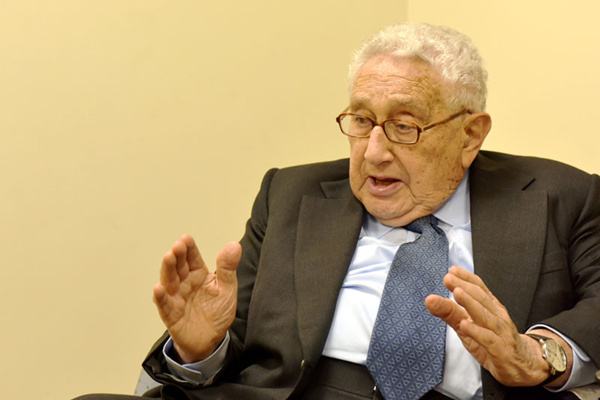


File Photo: Henry Kissinger
Getting the China-U.S. relationship right is the key element for world peace, but a big question mark hangs over the world’s most important bilateral relationship. At this year's China Town Hall, sponsored by the National Committee on U.S.-China Relations, former Secretary of State Henry Kissinger provided Americans and Chinese throughout the U.S. and in China an opportunity to learn about and reflect on the China-U.S. relationship. With U.S. democracy in chaos and tensions between China and the U.S. rising, his comments could not have been timelier.
The modern China-U.S. relationship took shape in 1971 when Kissinger made a secret trip to China for the purpose of opening relations. Asked what we can learn from that period for China-U.S. policy today, Kissinger said that the most important lesson in general is that, “The Chinese have a different history and a different culture from the United States. We have lived securely; the Chinese have always had enemies all around them.” As we try to move the relationship forward, it is important for U.S. leaders to understand that China developed under much different conditions.
Because there are many differences between China and the U.S., it is important that the two sides understand each other, especially at the highest levels. Kissinger said it is extremely important for “the political leaders of both sides to understand the way of thinking of the other.” It important for U.S. leaders to understand that the Chinese have a different history and culture from the U.S., but it is also important they understand the reasoning behind China’s policy decisions.
It should be noted that Kissinger and former President Richard Nixon made history for one very important reason. They focused on common interests rather than differences. In what is commonly known as the Shanghai Communiqué, the two sides agreed to further normalize relations and continue to exchange views on “issues of common interest.” Concentrating on common interests rather than differences has been the fundamental underpinning of the China-U.S. relationship ever since. If the China-U.S. relationship is to remain strong, then the U.S. will need to focus on points of common interest with China.
The big question today is whether the world’s most important bilateral relationship can be sustained, and the answer to this question depends on the U.S. Kissinger pointed out, for example, that China should be part of the Trans-Pacific Partnership (TPP) because it is important for the U.S. to form “organic, non-military relationships with Asia” and be part of the regional structure through partnerships. Yet the U.S has done the exact opposite. In May 2016, for example, President Barack Obama accused China of trying to “carve up” world markets at America’s expense and said that the U.S. should write the new rules. An effort to contain China is the wrong approach, because it will only split Asia.
China is the key element for world peace. If the China-U.S. relationship is constantly conceptualized as adversarial, then there will be conflict sooner or later. This means it is important for the two sides to form partnerships of common interest in order to strengthen and sustain the world’s most important bilateral relationship. As the chaos of the election cycle subsides, let us hope that the U.S. thinks long and hard about the future of the China-U.S. relationship.
 Fire brigade in Shanghai holds group wedding
Fire brigade in Shanghai holds group wedding Tourists enjoy ice sculptures in Datan Town, north China
Tourists enjoy ice sculptures in Datan Town, north China Sunset scenery of Dayan Pagoda in Xi'an
Sunset scenery of Dayan Pagoda in Xi'an Tourists have fun at scenic spot in Nanlong Town, NW China
Tourists have fun at scenic spot in Nanlong Town, NW China Harbin attracts tourists by making best use of ice in winter
Harbin attracts tourists by making best use of ice in winter In pics: FIS Alpine Ski Women's World Cup Slalom
In pics: FIS Alpine Ski Women's World Cup Slalom Black-necked cranes rest at reservoir in Lhunzhub County, Lhasa
Black-necked cranes rest at reservoir in Lhunzhub County, Lhasa China's FAST telescope will be available to foreign scientists in April
China's FAST telescope will be available to foreign scientists in April "She power" plays indispensable role in poverty alleviation
"She power" plays indispensable role in poverty alleviation Top 10 world news events of People's Daily in 2020
Top 10 world news events of People's Daily in 2020 Top 10 China news events of People's Daily in 2020
Top 10 China news events of People's Daily in 2020 Top 10 media buzzwords of 2020
Top 10 media buzzwords of 2020 Year-ender:10 major tourism stories of 2020
Year-ender:10 major tourism stories of 2020 No interference in Venezuelan issues
No interference in Venezuelan issues
 Biz prepares for trade spat
Biz prepares for trade spat
 Broadcasting Continent
Broadcasting Continent Australia wins Chinese CEOs as US loses
Australia wins Chinese CEOs as US loses